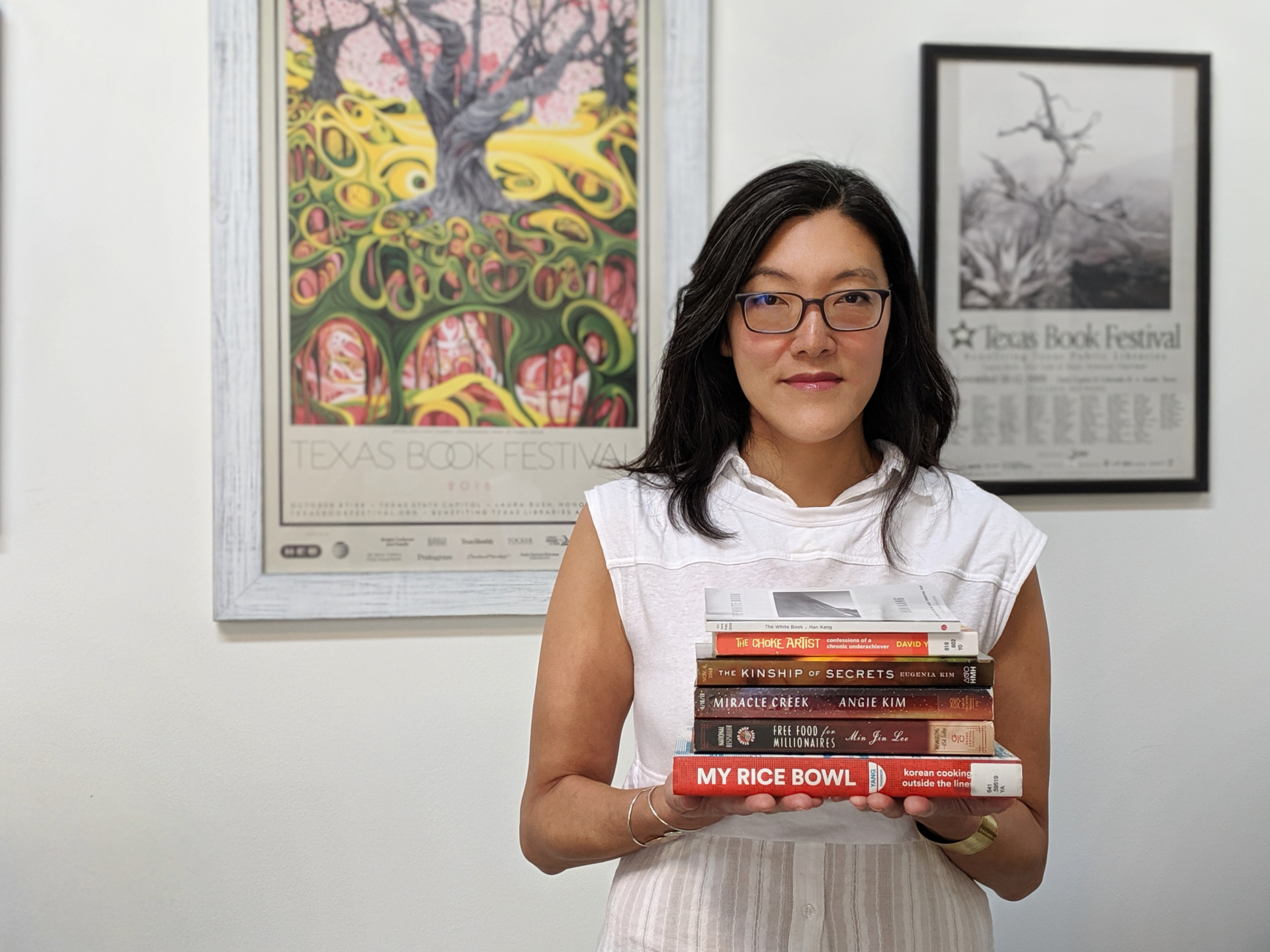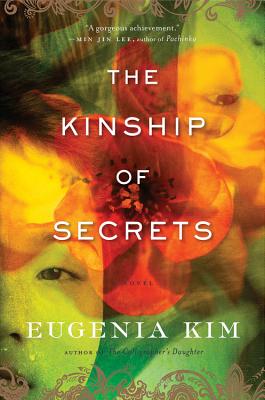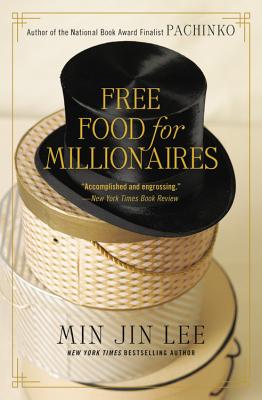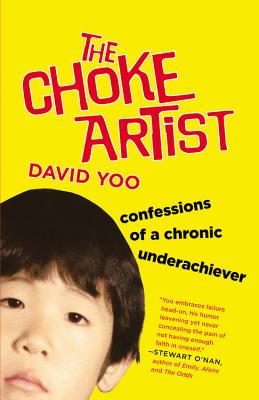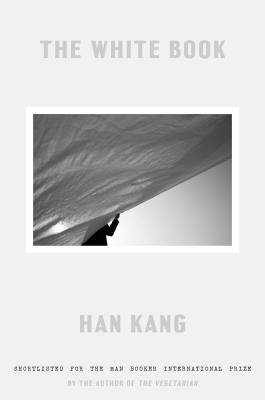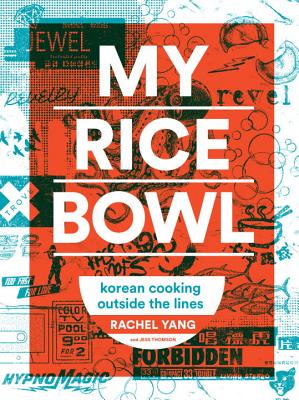Join us in celebrating Asian American/Pacific Islander Heritage Month! We’re highlighting AAPI literature and members of our state’s literary community. Today’s post comes from our own Executive Director, Lois Kim. For our wrap up to Asian American/ Pacific Islander Heritage Month, Lois is recommending some favorite books, across several genres, by authors who share her Korean heritage.
Eugenia Kim, The Kinship of Secrets
I was interested in reading this book because it details the impact of the Korean War on a family who is uprooted from Seoul when the Northern Korean Army invades the city in 1950 and the family is forced to flee to the South. My mother experienced this same journey when she was ten years old with some of her brothers and my grandmother, and I wanted to have a deeper understanding of that lived experience. Kim delivers all—its historical context, physical experience, and psychological terrain—in vivid detail. The novel begins with the heartbreaking separation of families: Miran, who journeys as a baby to the U.S. with her parents before the war, and Inja, the daughter who is left behind in Korea with her relatives and are the ones who are uprooted when the war breaks out. What is intended to be a temporary separation becomes a long one, and Kim follows both sisters’ stories with resonating emotional detail. I’m suggesting it as the all-summer read for three generations of my maternal extended family: the first generation who experienced the war directly; my generation—my sisters, cousins, and myself—born in Korea or the US, but all raised in the States; and the third generation of our kids, all biracial, who range in age from elementary to post-college, many of whom have never been to Korea or don’t know its history. This book is not only for readers of Korean descent, of course, and will be compelling to any readers interested in multigenerational stories and historical fiction.
Min Jin Lee, Free Food for Millionaires
If you follow TBF, you know that we’ve been obsessed with Min Jin Lee ever since she came as a featured author and gala speaker at our 2017 Festival. It’s been incredible to see the impact that she and Pachinko have made on so many readers around the world. If you can’t wait for American Hagwon, the novel Lee is working on now, then check out Free Food for Millionaires, Lee’s first novel. It’s a very different book than Pachinko, but similarly expresses Lee’s ability to draw genuine human characters in a fully realized social world—in this case, the epicenter of immigrant aspiration and dreams, New York City in the 1990s. Lee follows the fortunes of Casey Han, a Princeton-educated daughter of Korean immigrants as she navigates love, career, and her longing to belong, the itch that can never quite be scratched to satisfaction for generations of immigrants and immigrant children sorting through where and how they belong in America.
This is a seriously funny memoir and like in all truly funny memoirs, David Yoo doesn’t hold back in relating—in excruciating, painful detail—every indignity, moment of shame, and feeling of self-loathing as he comes of age in the exceedingly white environs of his childhood Connecticut suburb, small upstate New York liberal arts college, Colorado grad school, and beyond. His adult self reflects on the myriad desperate ways he tried to fit in at the expense of loving himself and accepting his ethnicity, to great tragicomic effect. I would love for my teenage kids and their cousins to read it, but as it contains many, many depictions of awkward sexual encounters, I will have to find another way for them to find the book than having their middle-aged mother/aunt recommending it to them, as they would die of embarrassment—which would be fitting, as this book is a long exercise in the limitless ways young people are embarrassed and not yet able to fully grasp the tender needs driving their seemingly inexplicable behaviors.
Lovely and vivid, The White Book is what it says it is: a book about white things. Swaddling bands, a newborn gown, salt, snow, ice, moon, rice, and other white things capture Han Kang’s imagination. The book is very short (heads up to those of you trying to do the 50 book challenge!), and it feels more like a collection of short poetic essays than a novel, but the meditations do progress. There is a story of personal loss behind Kang’s narrative, but readers will find their own meanings in Kang’s descriptions and orderings of white things. It is a very different book from her Man Booker award-winning The Vegetarian, but just as skillful in conveying a haunting sense of isolation, beauty, and loss.
I love to cook. One of the perks of my job is occasionally get my hands on some cookbooks I might not otherwise see. I picked up an advance reading copy of My Rice Bowl a couple of years ago and decided to make several recipes with friends for New Year’s Eve dinner last year. Yang’s cookbook hits all my sweet spots of what I look for in cookbooks: great to read, with lots of personal narrative about how chefs interpret their culture through their cuisine, beautiful photographs (of course), and ambitious but not too ambitious recipes. In cooking for family and friends, I aspire to shoot for one or two steps above what I would normally cook for dinner (e.g., throw some protein and veggies on a sheet pan with good olive oil, Maldon salt, and pepper, then roast at a high temperature), as I don’t have the patience to do anything too fussy with a ton of difficult techniques. I grew up on my mom’s Korean cooking, and I so appreciate how Yang honors the spirit of traditional Korean dishes while riffing on new ingredients and combinations of flavors.
Favorite crowd-pleasing recipe: Crispy Cauliflower with bagna cauda and pickled lemons. Trust me. If you make it, your people will love it.
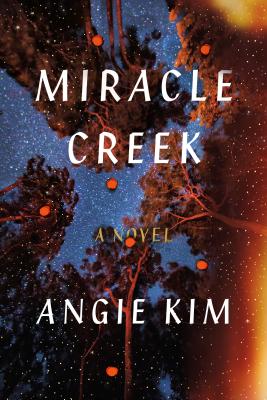 This book only came out last month, and I just opened it up, but can attest that Miracle Creek grabs you from the first pages. An immigrant couple, their unusual oxygen chamber contraption, and a disorienting accident lead right into a courtroom trial of what happened in this “miracle submarine,” an oxygen vessel that promises to cure autism, infertility, and other conditions. This book promises to be a page-turning legal and human drama that I’m planning to take to the beach. Read it with me and let me know what you think!
This book only came out last month, and I just opened it up, but can attest that Miracle Creek grabs you from the first pages. An immigrant couple, their unusual oxygen chamber contraption, and a disorienting accident lead right into a courtroom trial of what happened in this “miracle submarine,” an oxygen vessel that promises to cure autism, infertility, and other conditions. This book promises to be a page-turning legal and human drama that I’m planning to take to the beach. Read it with me and let me know what you think!

